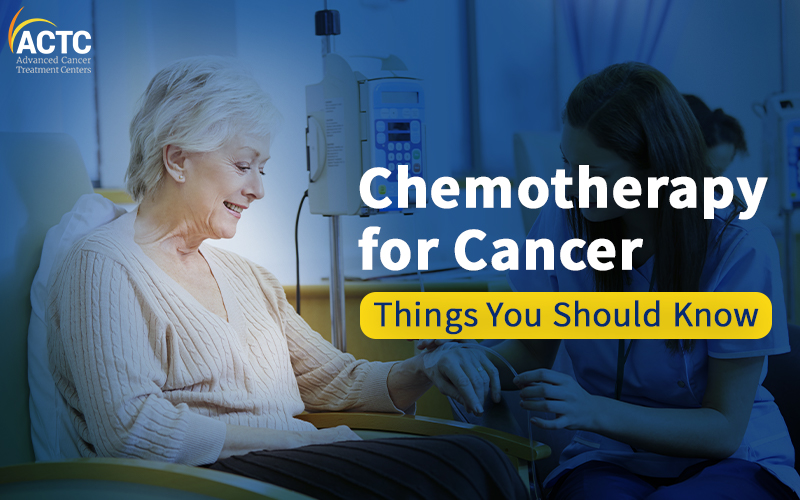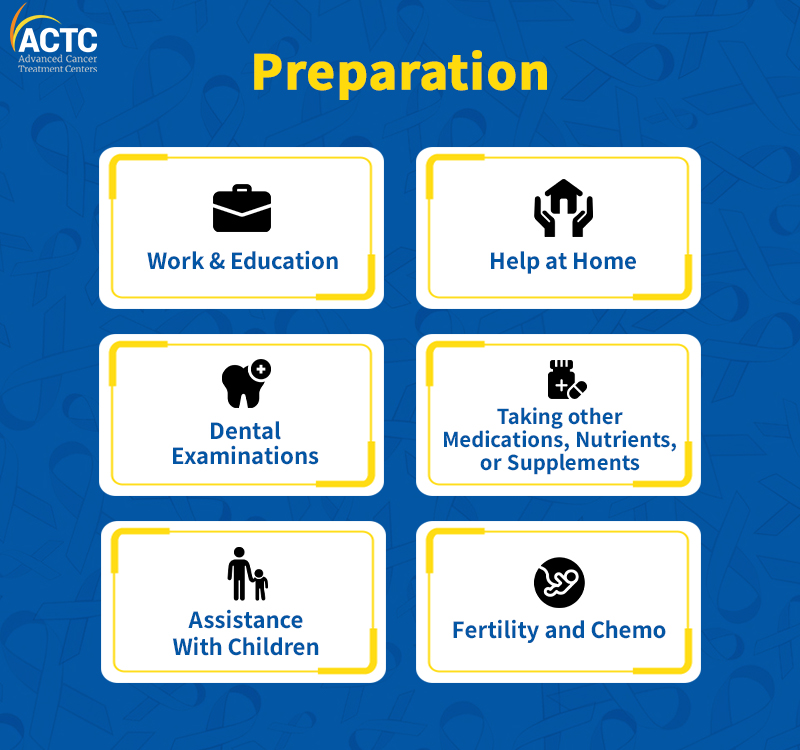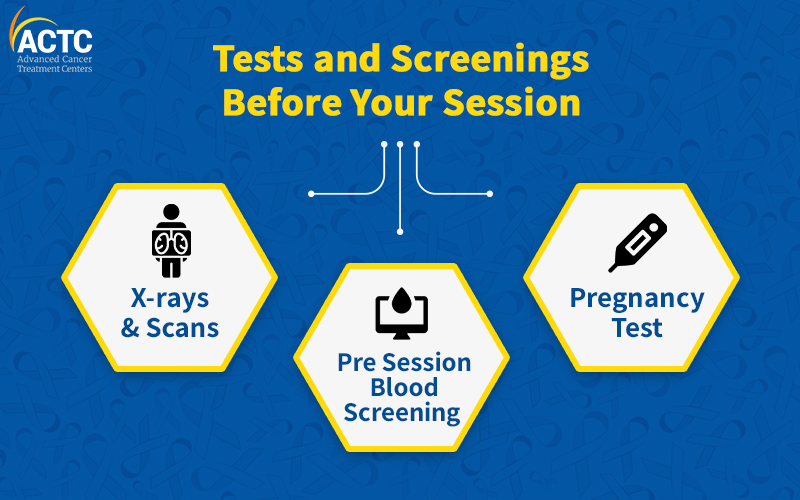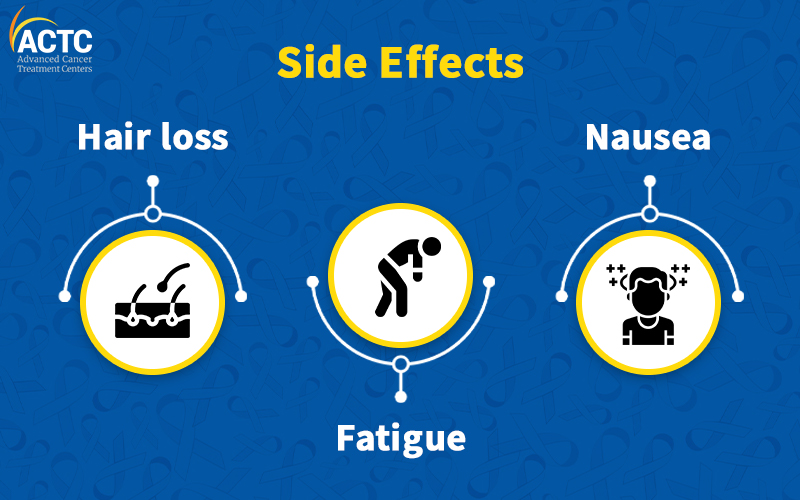
Book a Consultation
Thank you!
Your form has been sent successfully.



February 16, 2022
A healthy body constantly keeps producing cells through the process of dividing and growing. But when the body starts to rapidly produce more cells these cells start to occupy the space left by the previous cells. When these cells settle at a fast pace they start to accumulate rapidly and this leads to the formation of tumours.
Chemotherapy is one way to stop these cells from growing rapidly - using anti-cancer (cytotoxic) medicines.
The objective of administering chemotherapy is to stop the growth of new blood vessels. This stops these new blood vessels from supplying blood to the tumor which will eventually lead to healing the tumor. However studies have shown that chemotherapy medications may also affect some of your body's healthy cells, This leads to certain complications.
The majority of negative effects subside once treatment is completed. If you or a loved one have chemotherapy prescribed as part of your treatment, read on to know about chemotherapy, the procedure, testing, side effects, preparation and aftercare, so that you are informed and well- prepared for your treatment.
Chemotherapy sessions will depend on the type and stage of cancer detected. There are different kinds of chemotherapy treatments available. The number of sessions also may vary from patient to patient. For some - a few sessions of chemotherapy are enough for them to become cancer free, while for others it may take longer to recover.
During a chemotherapy session, the medication is either given through an IV line or in the form of pills or capsules. In some cases, creams may be used to treat skin cancer. Usually most people would receive the treatment at a clinic or treatment centre, but sometimes a person can also take these medications at home. In such cases it is very essential that the medications are taken at the exact time as prescribed. If that doesn’t happen by any chance, you should consult the doctor immediately.
Chemotherapy is normally administered in a series of sessions, with rest breaks in between. Your body will be able to recover from any side effects during the rest period. This rest period also allows the healthy cell count in your blood to return to normal. A cycle of your treatment consists of chemo and a period of relaxation. Your oncologist will tell you how many cycles you'll need to manage the cancer. You'll have a good idea of what is happening to your body after your first cycle, how you can cope and how much you'll be able to do during your therapy.

Learning about chemotherapy treatment and its impact will help you be more prepared and enable you to stay in control.
Check out the following steps to know more:

Before starting chemotherapy, your oncologist or nurse will discuss any tests, scans, or check-ups you may require. Some of them are as follows:
Before you start chemotherapy, you may require tests to evaluate the overall functioning of certain organs, such as the lungs, heart, or kidneys. Different types of x-rays or scans may be recommended. An electrocardiogram (ECG or EKG), for example, can be recommended if you are taking medications that may affect your heart.
Before every cycle of chemotherapy, you will be asked to give a blood sample. Your blood can be screened 1 to 2 days before chemotherapy to save time.
Before beginning therapy, women may need to take a pregnancy test.
Chemotherapy can be administered to a person in various forms, depending on their type of cancer and the treatment planned according to their oncologist, who will go through everything with you.
Depending on the type of chemotherapy prescribed, you may need to take your treatment as an inpatient or as an outpatient.
Chemotherapy may be administered in various methods :
- Infusion or IV line directly into the bloodstream, known as intravenous chemotherapy
- Oral chemotherapy in the form of pills or capsules.
- Injection into a muscle, also known as intramuscular chemotherapy
- Injection into the skin or subcutaneous chemotherapy
- Directly into a bodily cavity or intracavitary, such as the bladder
- Directly to the skin as a cream for some skin cancer cases
Sometimes Chemotherapy can also involve other procedures such as :

Chemotherapy treatment may result in side-effects. Some are more prevalent than others. It’s also possible for a patient not to feel any side effects. Chemotherapy is meant to stop cells from multiplying rapidly, but during this treatment while the cancer cells are being diminished, the other healthy cells in your body may also be affected.
Some of the common side effects that occur during chemotherapy are as follows :
While these are the most common side effects there may be other side effects such as easily bruising and bleeding, diarrhea, dry mouth, mouth soreness, loss of appetite, etc.
Chemotherapy may have long-term consequences for certain people. These side effects can continue for six months or even develop years after chemotherapy.
The success of your treatment will be monitored by your doctor and cancer care team regularly. Screening tests and blood tests are often done routinely. It’s best to have a clear communication with your oncologist during and after your treatment. Any adverse effects or post treatment-related challenges should be reported to your doctor for appropriate action.
Chemotherapy can take a lot from a person physically and mentally. Despite this, it’s worth noting that in most cases the positive outcome of curing cancer outweighs the negative impact of chemotherapy.
It is best to go to your oncologist who will guide and recommend the best option for you.
Infographic:



January 07, 2026
A chemo port is a small device placed under your skin that makes recei...
KNOW MORE

December 24, 2025
It's natural to wonder if testosterone replacement therapy (TRT) is sa...
KNOW MORE

December 24, 2025
A rash that will not calm down is scary, especially when it changes or...
KNOW MORE

December 24, 2025
Florida’s lung cancer burden remains significant and affects many fa...
KNOW MORE

December 24, 2025
A partial hysterectomy, also called a supracervical hysterectomy, is s...
KNOW MORE

December 24, 2025
Finding a rash on your breast can be unsettling, but remember, many ra...
KNOW MORE
